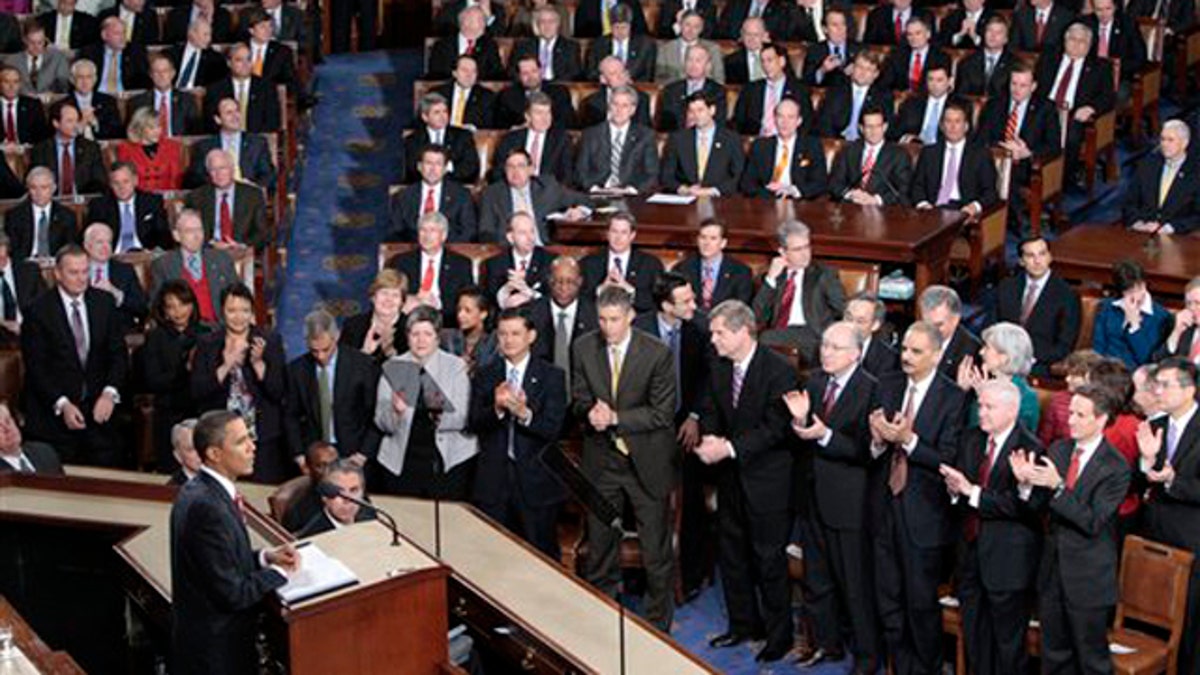
In this Jan. 27, 2010, photo President Barack Obama delivers his State of the Union address on Capitol Hill in Washington. (AP)
President Obama will call for a five-year freeze on non-security discretionary spending during his State of the Union address to Congress late Tuesday, a White House official told Fox News.
"As a down payment toward reducing the deficit, the president is calling for a five-year freeze on non-security discretionary spending. In areas outside the freeze, we also will be looking for cuts and efficiencies," the official said, citing a five-year plan developed by Defense Secretary Robert Gates to cut $78 billion from the Pentagon budget.
Senate Minority Leader Mitch McConnell spokesman Don Stewart expressed cautious optimism about the proposal.
"At first blush, it appears the president has realized his budget requests have been too big. We'll wait to see the details," Stewart said.
But House Speaker John Boehner's spokesman said the president won't have gone far enough.
"At a time when the treasury secretary is begging Congress to raise the debt limit, this is simply inadequate," said spokesman Michael Steel. "Rather than lock in the consequences of Washington Democrats' job-destroying spending spree, we pledged to cut spending to pre-bailout, pre-stimulus levels and impose real spending caps. That's a far more serious plan to cut spending and help create jobs."
Obama is under pressure from the public and lawmakers to cut spending. The Republican-led House voted Tuesday on a resolution that would slash non-defense related discretionary spending to 2008 levels.
Click here to see how your representative voted.
In many respects, the vote is a bit of theater, timed before the State of the Union speech. Critics contend the plan contains no specifics as to what is cut.
"It gives Paul Ryan unilateral authority to set the funding mark," said House Minority Whip Steny Hoyer, D-Md. "Members will be voting blind."
Seeking to grasp the mantle of fiscal responsibility, Hoyer urged reporters to contrast budget deficits under Republican presidents with deficits under a Democratic White House.
"We adopted a program in 1993 which led to 4 years of surpluses," he said, "so don't look at what we say, look at what we accomplished."
But Rep. David Dreier, R-Calif., chairman of the House Rules Committee, said time has run out to keep spending at its present levels.
"The looming crisis of our national debt is a challenge that working Americans recognize very clearly. While the magnitude of a $14 trillion debt is simply too massive to truly comprehend, those with a modicum of common sense can appreciate the crushing weight that will fall on future generations. If we do not immediately change course, the damage could quickly become irreversible," he said before the vote.
Last year, the president proposed a three-year freeze on non-security discretionary spending. However, Democrats never produced a budget resolution and the Congress deferred to a continuing resolution until March to sort out the budget schedule for the fiscal year ending Sept. 30.












































